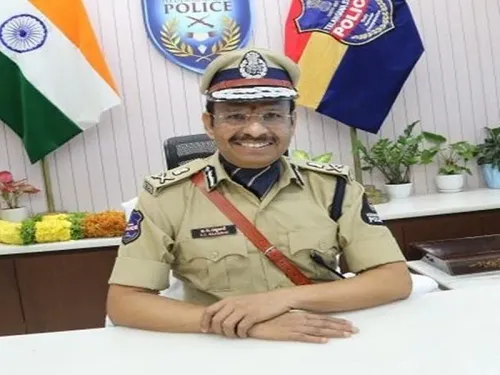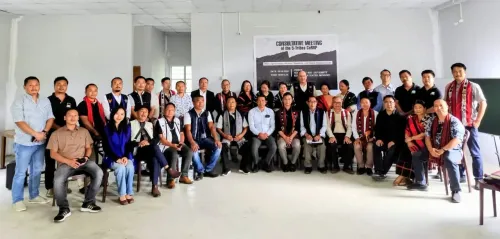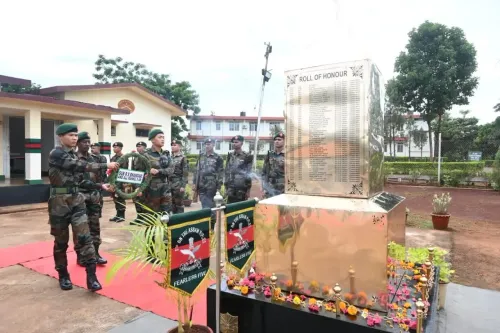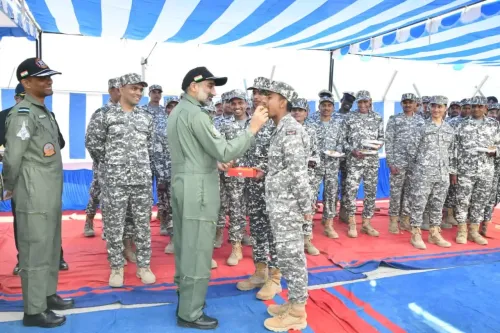Why is CM Siddaramaiah urging PM Modi for more funding to Karnataka?
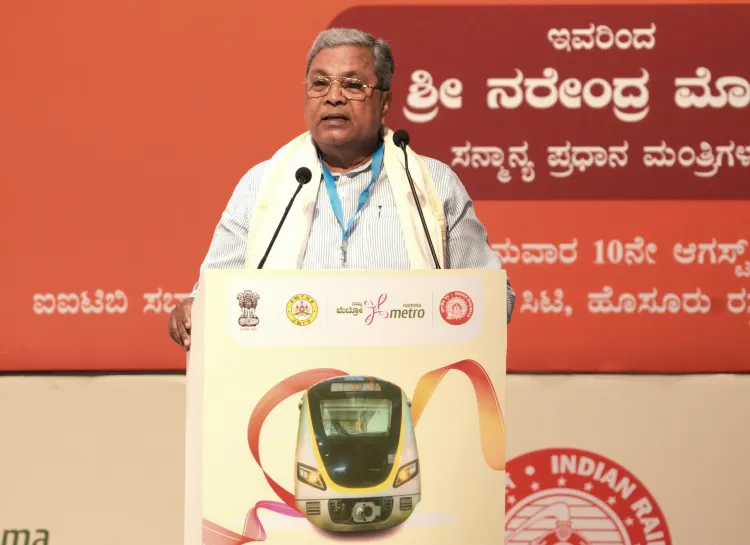
Synopsis
Key Takeaways
- Karnataka seeks increased funding from the Central government.
- The state contributes 87.37% of Metro project costs.
- The Yellow Line will serve 3.5 lakh commuters daily.
- By 2030, Bengaluru aims for 220 km of Metro routes.
- Private partnerships are crucial for infrastructure development.
Bengaluru, Aug 10 (NationPress) The Chief Minister of Karnataka, Siddaramaiah, on Sunday made a heartfelt request to Prime Minister Modi to prioritize Karnataka in terms of fund allocations.
His remarks came during the inauguration of the Yellow Line of the Metro project, while also laying the foundation for the third phase of the Metro project in Bengaluru.
Turning towards PM Modi, CM Siddaramaiah emphasized, "I urge the Prime Minister to prioritize Karnataka just as Maharashtra and Gujarat have been prioritized."
In response to laughter from the audience, he clarified that he was simply seeking additional support from the Central government for Karnataka.
Discussing the Bengaluru Metro project, CM Siddaramaiah noted, "The state government is covering 87.37% of the project costs, while the contribution from the Central government stands at a mere 12.63%."
He acknowledged the role of the Central government in the execution of the Bengaluru Metro project, stating, "The Central government provides both financial and technical assistance for the Metro project. To date, the state has invested Rs 25,387 crore across phases 1, 2, 2A, 2B, and 3. An additional Rs 3,987 crore has been allocated for loan repayment assistance, totaling Rs 59,139 crore for the Metro initiatives. The Central government has provided only Rs 7,468.86 crore," he added.
CM Siddaramaiah highlighted that while it was initially agreed that investments would be shared equally between the Karnataka and Central governments, much of the funding from the Central government has come in the form of loans that the state must repay with interest, resulting in a disproportionate burden on Karnataka.
He mentioned that improving connectivity and transforming Bengaluru into a globally appealing city is a significant priority for all.
With the launch of the Yellow Line, Bengaluru Metro now spans a total operational length of 96.1 km, making it the longest Metro network in South India. This milestone is a point of pride for every Kannadiga and demonstrates our commitment to development," CM Siddaramaiah remarked.
He urged the Central government to allocate more funding for Bengaluru's development and the broader national progress.
According to the CM, there is a collaborative effort between the Central and state governments to enhance citizen services, and he expressed optimism that this partnership will only strengthen.
The newly inaugurated Yellow Line, which cost Rs 7,160 crore, connects essential IT and technology sectors in Bengaluru, facilitating safe and swift travel for thousands of professionals, workers, and students. It is projected to accommodate nearly 3.5 lakh commuters daily, significantly alleviating traffic congestion around Central Silk Board and Jayadeva Hospital.
CM Siddaramaiah noted, "The Yellow Line also links major biotech and IT hubs while providing convenient access to crucial hospitals and industrial areas. The double-decker flyover funded by the state government from Ragigudda to Central Silk Board will enhance traffic movement at one of Bengaluru's busiest intersections. This is a testament to the state government's commitment to addressing Bengaluru's traffic challenges."
As urbanization and population growth exert immense pressure on city roads, CM Siddaramaiah revealed that nearly nine lakh passengers use Bengaluru Metro services each day. With the introduction of the Yellow Line, the number of daily commuters is expected to surpass 12.5 lakh.
"There is a long journey ahead for the Bengaluru Metro route. Once the second phase is operational, we will achieve a total of 117 km of Metro connectivity, enabling 15 lakh people to commute by Metro each day," asserted CM Siddaramaiah.
He added, "Phase 2A and 2B, featuring a 58 km route linking the Outer Ring Road to the airport at a cost of Rs 15,131 crore, is slated for completion by December 2027. This route will connect the international airport to Bengaluru city."
Furthermore, he stated, "Phase 3, spanning 44.65 km and costing Rs 15,611 crore, will further enhance Bengaluru's connectivity. Civil works for this phase have recently commenced," he emphasized.
CM Siddaramaiah mentioned that feasibility studies are ongoing for Phase 4, which includes a 53 km double-decker Metro route.
"By 2030, our ambition is to finalize 220 km of metro routes in Bengaluru, facilitating infrastructure for 30 lakh daily commuters," he asserted.
He acknowledged the involvement of private entities such as the Infosys Foundation, Biocon, and Delta Electronics in constructing Metro stations.
CM Siddaramaiah expressed confidence that public-private partnerships will bolster the ongoing development initiatives in Bengaluru.
He concluded, "Karnataka contributes 35-40% to the country's IT exports, with Bengaluru playing a significant role. The state is also responsible for over 40% of electronics and R&D exports. In this light, the government has outlined projects exceeding Rs 1.35 lakh crore to enhance Bengaluru as a model city, with numerous initiatives already underway."
He urged the Central government to collaborate for Bengaluru's development, which plays a crucial role in the country's economy.

